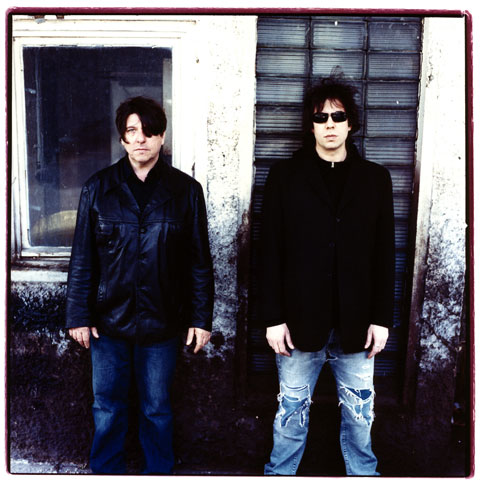
THE CUTTER “We wanted to be hip, but without wanting to try to do it” says Will Sergeant. “It was natural to us, we just knew what to do, and what to avoid.” |
It's safe to say that the impact and importance of rock bands has often been drastically overstated. Touted at various times as capable of stopping wars, fighting fascism, exposing tyranny, and ending poverty, rock culture has definitely fallen short when it's come time to fork over results. One thing the culture has been able to do, however, and do exceedingly well, is define and redefine "cool" for successive generations. Playing instruments, writing lyrics, hitting notes, raising fists, teasing hair, applying eyeliner — it's all in the service of showing a sometimes adoring audience How To Be Cool. And if you lived through the late '70s or the early '80s and you had a clue about anything having to do with "cool," you worshipped Echo & the Bunnymen.Why? Well, they were from Liverpool, for one, and they weren't afraid to mix in a Beatles obsession with their dark post-punk. They also had amazing songs, looked awesome, and pulled it all off without appearing to try too hard. "We never had any plan," is how guitarist Will Sergeant puts it, in his thick Liverpudlian brogue, when I reach him at his home studio on the eve of a tour revisiting their classic first two albums that comes to the Paradise this Monday. "We never knew what was round the next corner; all we knew was that we didn't want to be one of these sorts of bands that did uncool stuff. Like, you know, climb up scaffolding waving white flags. That sort of cheesy crap really put us off!"
Right there is the difference between a band destined to sell out stadiums for the next three-plus decades between sit-downs with the pope and a cool band that will become legendary, right? "We wanted to be like the Velvet Underground," Sergeant adds. "We wanted to be hip, but without wanting to try to do it. It was natural to us, we just knew what to do, and what to avoid. So much of it is about what to avoid, not what to do, d'you know what I mean?"
Sergeant and co-conspirator Ian McCulloch formed Echo & the Bunnymen as teenagers in 1978, turning a post-punk landscape on its ear. While everyone else was screaming and ranting, they were æthereal, enveloping, and brooding, with McCulloch's deep voice and Sergeant's ringing tones veering into non-rock territories where most contemporary acts feared to tread. Their debut, 1980's Crocodiles, and its '81 follow-up, Heaven Up Here, bore witness to a band equally at ease with jittery rave-ups and Eastern-influenced psychedelia. When it all came together under the umbrella of a monster hook, as on the breakthrough early singles "Rescue" and "A Promise," it made the thorny pretentiousness of their fellow new-wavers seem — well, as if they were trying too hard.